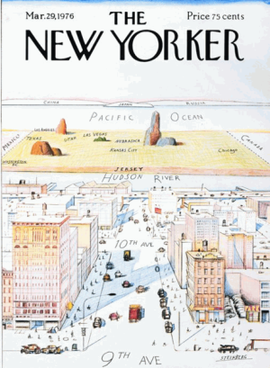We have all read over the last twenty years that the coastal elites don't care about "flyover country," sometimes even including the native sons and daughters who went on to big things in New York or Silicon Valley, or even their elected representatives in DC, who went native in Emerald City and never looked back. It is a familiar theme in American literature for generations, including one from rural NH, The Old Homestead. It is familiar long before that, in the Greek theater and Roman republic. The boy heads for the bright lights of Broadway and not only forgets how to shoe a horse, but no longer thinks it's important. He loses his homespun values.
I remember hearing something similar in the late 90s and early 2000s when I became interested in Romania and Eastern Europe in general, and started following international affairs on the internet for about a decade. The accusation was frequently made that Americans didn't know anything about geography and other places of the world, all of which glowered resentfully because they sure knew a lot about us, but we paid no attention. The ignorance of Americans about the rest of the world, in contrast to their enlightened world-knowledge was regarded as a given then, and I think that persists. As proof, they point out that Americans can't find Iraq and Afghanistan on a map, despite fighting wars there. Someplace along the line I decided that this is just plain inaccurate. Does Slovakia know much about Ecuador? Can Vietnamese students find Moldova on a map? Japanese artists know about New York (and Vancouver). Do they know anything about Butte or Sherbrooke, QC? Those places have lots of kids that know about them. Size and cultural/economic importance matter.
I have discovered that it is much the same in flyover country from observing comments and behavior during C19. South Carolina does not much care about Montana does not notice New Mexico could not care less about Indiana. People care a bit about Texas and Florida, but those loom large in both population and popular culture. Oklahoma and Georgia, though right next door to those, can go pound sand for all the NYT or LATimes is concerned, unless there is an opportunity to kick them for supposed ignorance and backwardness.
There was a mass murder in Nova Scotia in the last couple of months, and it has both a CoVid economic loss and gun control angle, but I haven't seen anything about it here, nor heard of it even from friends with strong connections to the Maritimes. 22 people dead. We don't care.
We can deplore those elitists in the cities whose blinkered perspective was so elegantly captured in the New Yorker cover years ago, but we do exactly the same thing.
I care a little what happens in Maine or Massachusetts because I have a few friends there, but I don't much care what happens in VT, CT, or RI, even though they are part of New England, which is the region I am supposed to be attentive to. I care about New Hampshire. Not even all of that, frankly, though I can manage it with a little effort, town by town.
This is going to play out powerfully over the next few months as a steady (though hopefully decreasing) stream of people keep dying, but hey, we don't living in Arizona, so it's like no real dead people. Flyover cares about NYC because it's big and the numbers are big. It is also culturally large in the history of America so we pay attention, love it or hate it. It was interesting this time in that there seems to be a marginal decrease in the amount of caring about NYC and a marginal increase in the resentment of it, so a few New Yorkers were furious at this attitude from Flyover, East Dakota.

2 comments:
The resentment gets magnified when the stranger seems to have excessive power. The Moldovans don't care about the Guatemalans, and vice versa, but there's no resentment. Bankers in Chisinau (*) don't effect mortgages in Guatemala City.
New York is another matter. And wrt schools--remember when California and Texas determined pretty much everything in the English textbooks?
(*)Yes, I had to look that up.
I used to live on that top line of yellow, but now am slightly inland.
Post a Comment